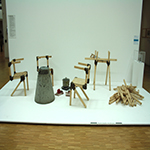Euroacademia Conferences
 Europe Inside-Out: Europe and Europeanness Exposed to Plural Observers (9th Edition) April 24 - 25, 2020
Europe Inside-Out: Europe and Europeanness Exposed to Plural Observers (9th Edition) April 24 - 25, 2020 Identities and Identifications: Politicized Uses of Collective Identities (9th Edition) June 12 - 13, 2020
Identities and Identifications: Politicized Uses of Collective Identities (9th Edition) June 12 - 13, 2020 8th Forum of Critical Studies: Asking Big Questions Again January 24 - 25, 2020
8th Forum of Critical Studies: Asking Big Questions Again January 24 - 25, 2020 Re-Inventing Eastern Europe (7th Edition) December 13 - 14, 2019
Re-Inventing Eastern Europe (7th Edition) December 13 - 14, 2019 The European Union and the Politicization of Europe (8th Edition) October 25 - 26, 2019
The European Union and the Politicization of Europe (8th Edition) October 25 - 26, 2019 Identities and Identifications: Politicized Uses of Collective Identities (8th Edition) June 28 - 29, 2019
Identities and Identifications: Politicized Uses of Collective Identities (8th Edition) June 28 - 29, 2019 The European Union and the Politicization of Europe (7th Edition) January 25 - 26, 2019
The European Union and the Politicization of Europe (7th Edition) January 25 - 26, 2019 7th Forum of Critical Studies: Asking Big Questions Again November 23 - 24, 2018
7th Forum of Critical Studies: Asking Big Questions Again November 23 - 24, 2018 Europe Inside-Out: Europe and Europeanness Exposed to Plural Observers (8th Edition) September 28 - 30, 2018
Europe Inside-Out: Europe and Europeanness Exposed to Plural Observers (8th Edition) September 28 - 30, 2018 Identities and Identifications: Politicized Uses of Collective Identities (7th Edition) June 14 - 15, 2018
Identities and Identifications: Politicized Uses of Collective Identities (7th Edition) June 14 - 15, 2018
Cultural Diplomacy and the Temporary Studio
-
-

-
Presentation speakers
- Esther Tornai Thyssen, Emmanuel College, Boston, Massachusetts, USA
- Download presentation
Abstract:
Artists play a significant role in re-conceptualizing relationships between Europeans formerly kept asunder by the Iron Curtain. Many artists’ residency programs started up since 1989 and provide temporary studio space upon application and acceptance. The article discusses the purposes, scope, and outreach of such programs. The creative environment within the studio is fertile ground for the interchange of artistic practices, and a place where social and political ideas may be diffused. Artists explore various approaches and media, and absorb cues from one another. Travel to the studio location and time spent in the new cultural context are important. The direct experience of local life, social and geographical knowledge creates a platform for ease in cooperation. The artwork produced in shared studios often reflects reciprocal influences. Boris Groys observes that art today is created by the masses. Large numbers of contemporary European artists participate in residencies and contribute to the mass artistic production project. As they practice aesthetic equality among all visual forms, they bind the democratic dimensions of art and politics together into a powerful instrument of cultural diplomacy. -
Related Presentations


















